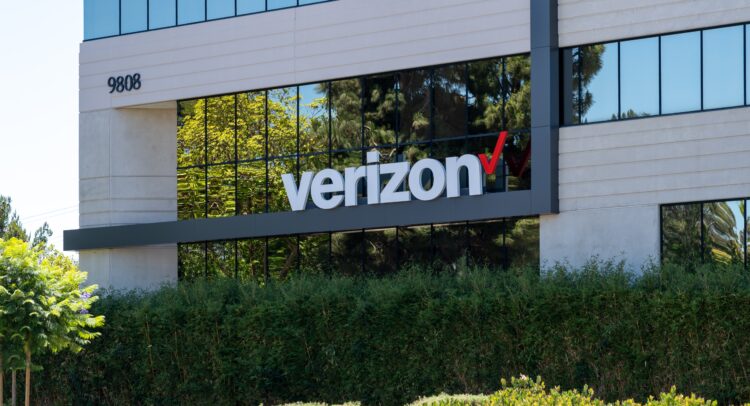Verizon’s (NYSE:VZ) dividend appears to remain safe, at least for now. The telecom behemoth recently posted its Q1 results, which were quite solid. Importantly, the company achieved growing revenues and free cash flow, instilling confidence among investors regarding dividend coverage. However, Verizon’s huge debt burden remains a persistent source of risk, casting a shadow over its financial stability. Without a tangible plan in place for the company to reduce its massive debt load, I’m neutral on VZ stock.
Q1 Results – Improving Results Will Boost Investor Confidence
Verizon’s Q1 results came with some noteworthy improvements across the board. Thus, despite a modest post-earnings dip in the share price, I believe the report will boost investor confidence in the stock once the market fully digests the numbers.
For starters, Verizon’s revenues rose by 0.3% year-over-year to $33.0 billion. The company maintained strong momentum in Broadband, adding 389,000 subscribers, including 53,000 Fios Internet (Verizon’s Fiber-Optic Internet Provider) net additions. Verizon Business also added 151,000 net fixed subscriptions in the quarter, marking the division’s best-ever quarterly result.
The company also reported a 3.3% increase in Wireless Service revenues in its Total Wireless division. Notably, this marked a pleasant acceleration in Verizon’s revenue growth, as the FY2023 growth rate, excluding the reallocation of certain revenues, was just 1.3%. The Verizon Consumer division saw Wireless Service revenue growth of 3.4%, driven by higher average revenue per account. These developments more than offset the $106 million drop in prepaid revenue due to 216,000 net declines.

Moving to profitability, Verizon’s adjusted EBITDA came in at about $12.1 billion, up 1.4% compared to the prior year, driven by the aforementioned growth in wireless service rates for revenue and lower operating expenses. Specifically, operating expenses, excluding depreciation, amortization, and special items, declined by 0.5% year-over-year due to lower equipment and cost of services-related expenses.
Note that adjusted EPS for the quarter landed at $1.15, marking a decline of 4.2% compared to the prior year. The growth in adjusted EBITDA was more than offset by higher interest expense on the company’s enormous debt balance. I will go over that in a second. Yet, due to the nature of Verizon’s business model, it’s far better to take a look at free cash flow. With CapEx for the quarter falling from $6.0 billion to $4.4 billion and Verizon’s operating cash flow coming in strong, free cash flow surged by 16% to $2.7 billion.
Verizon’s Dividend Remains Reliable
With Verizon’s free cash flow advancing notably in Q1, it seems that prior investor concerns regarding its dividend coverage should be somewhat alleviated. Following the company’s earnings report, consensus free cash flow estimates now stand at $18.8 billion, which should more than adequately cover the $11.1 billion per annum Verizon spends on dividends. In fact, I can see the company sustaining its prolonged dividend growth track record, now boasting 17 years of consecutive annual dividend increases.
Verizon’s Elephant in the Room Looms, Nonetheless
Verizon’s Q1 report may reassure investors about its 6.9%-yielding dividend, but it most certainly doesn’t solve the elephant in the room problem—its enormous debt burden. Verizon ended the quarter with a net debt position of $151.7 billion, which, for context, approaches the company’s market cap of about $163 billion. It’s not uncommon for an infrastructure-heavy company to have tons of debt. That said, Verizon’s case seems a bit extreme.
On a smaller scale, Verizon’s massive debt burden results in growing interest expenses in the current market environment, as I mentioned earlier regarding the decline in adjusted EPS. But that’s nowhere near the problem the company faces on a larger scale. That is, Verizon has to constantly rely on massive refinancings to stay afloat. For instance, the company has nearly $15.6 billion in debt maturing within a year, which it obviously can’t pay back, meaning that a big refinancing will have to take place.
Will the company refinance its debt successfully? Probably yes. However, the moment Verizon’s financials take a hit, it could be the moment everything starts crumbling. We saw this scenario play out with AT&T (NYSE:T). The company’s net debt position had almost reached $200 billion in 2022, and the moment its free cash flow dipped that year, management was forced to reduce payouts, bringing its 36-year dividend growth track record to an end. Such a scenario shouldn’t be dismissed in the case of Verizon as well.
Is VZ Stock a Buy, According to Analysts?
Turning to Wall Street, Verizon Communications has a Moderate Buy consensus rating based on nine Buys, eight Holds, and one Sell assigned in the past three months. At $44.39, the average VZ stock forecast implies 15% upside potential.
If you’re unsure which analyst you should follow if you want to buy and sell VZ stock, the most profitable analyst covering the stock (on a one-year timeframe) is Michael Rollins from Citi (NYSE:C), with an average return of 9.99% per rating and an 89% success rate. Click on the image below to learn more.

The Takeaway
To wrap this up, it’s important to distinguish the positive advances shown in Verizon’s Q1 results while not forgetting the underlying risks threatening its investment case. On the one hand, Verizon’s most recent earnings report showcased promising developments in revenue growth and profitability, which should instill confidence in investors regarding its dividend stability. On the other hand, the elephant in the room remains its huge debt burden, which poses a risk to both the dividend and Verizon’s investment case.
Thus, while investors can rely on Verizon’s dividend for the time being, caution regarding its long-term prospects is warranted.









